When do you use less, and when do you use fewer? It can be difficult to know the difference, but it’s important to get it right. In this post, we’ll explain the difference between less and fewer and give you some tips on how to use them correctly. We’ll also show you some examples to see how they’re used in context.
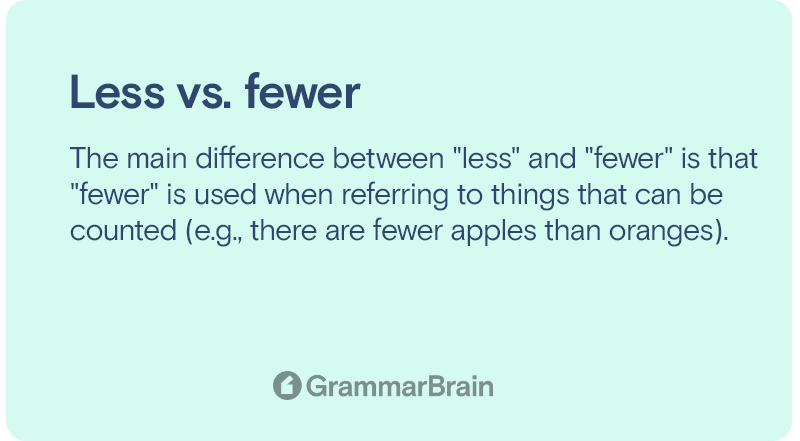
Difference between “less” and “fewer”
The main difference between “less” and “fewer” is that “fewer” is used when referring to things that can be counted (e.g., there are fewer apples than oranges). And “less” is used when referring to things that cannot be counted.
There is a rule of thumb that “fewer” should be used for things that are smaller in size, while “less” should be used for larger things. However, this rule is only sometimes followed, so it’s best to learn the rules for each specific word.
Less definition
Merriam-Webster defines “less” as:
- Having a smaller quantity, number, or extent. That is usually or customarily present or implied or not as great in magnitude, intensity, or degree as is usual or desired.
- Reduced in status, rank, or importance.
When used as an adverb, “less” typically means “to a smaller extent”: He speaks less fluently than she does.
As a preposition, it can mean “not so much”: I need less sugar in my coffee.
Fewer definition
Fewer refers to a quantitatively smaller number. Two items have fewer total points than three items. In certain contexts, it can indicate a smaller quantity than some other amount, as in “fewer than ten.” For instance, “I only have a few minutes left” refers to a smaller quantity of time remaining than the speaker expects.
Less vs. fewer examples
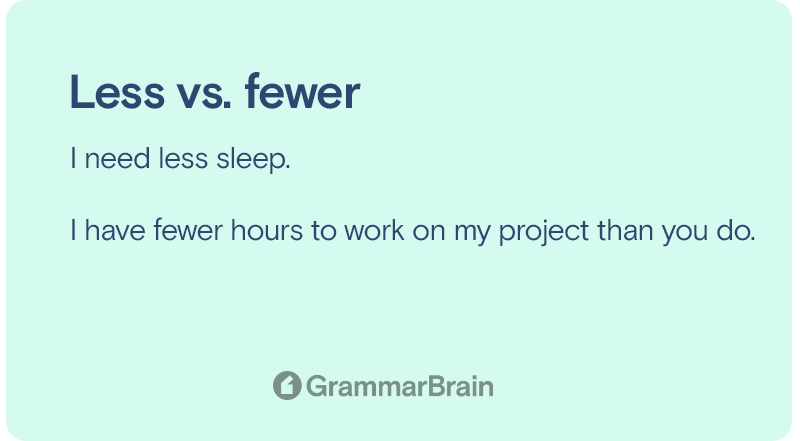
Time
Less:
- I need less sleep.
- I have less time than ever to work out.
- I have to speak with her less often.
- After less than a week of using the product, I noticed a difference in the texture of my skin.
- I only need to use it for less than five minutes each day.
- I’ve been using it for less than a month.
- It’s been less than a year since I started using it.
- Less than 5% of users report any side effects.
Fewer:
- We are spending less time at the beach this year because there are going to be fewer people coming.
- I have fewer hours to work on my project than you do.
- You can finish your project in fewer hours than I can.
- She has fewer days left to live.
- I have fewer days until my test than you do.
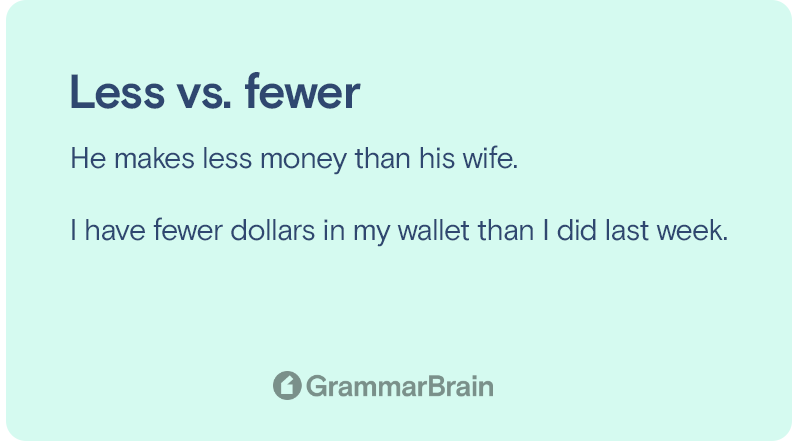
Money
Less:
- I make less money than my sister.
- He makes less money than his wife.
- She makes less money than her husband.
- They make less money than their neighbors.
- We make less money than they do.
- We have to find a way to make more money with less resources.
Fewer:
- I have fewer dollars in my wallet than I did last week.
- If you have fewer dollars, you will have to buy less.
- The CEO received a bonus of fewer than one million dollars.
- He has fewer assets than before the recession.
- I earn a salary of fewer than fifty thousand dollars per year.
- The company is offering a retirement package with benefits for employees with fewer than five years of service.
- She has fewer years left to live.
- He has fewer hours left to work.
- They have fewer days left on their vacation.
- The boat has fewer minutes before it arrives at the dock.
- There are now fewer seconds until the start of the race.
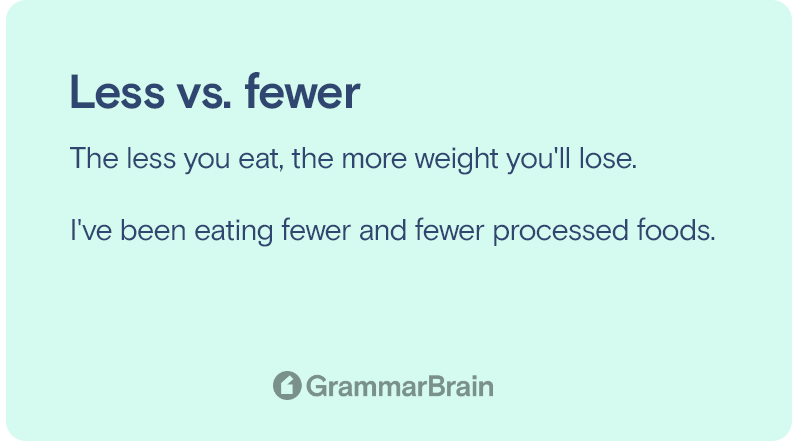
Weight
Less:
- The less you eat, the more weight you’ll lose.
- I weigh less than I did last year.
- He lost five pounds in two weeks, less than he wanted to lose.
- After two days of fasting, she had lost six pounds, or about one and a half kilograms – less than half the amount she needed to lose.
- Don’t be fooled by the number on the scale; because muscle weighs more than fat, you may be carrying around less weight but still, look large.
- The average person loses about one and a half pounds per week on a diet. That’s about seventy-two pounds in a year less than half of what is recommended.
Fewer:
- I’ve been eating fewer and fewer processed foods.
- The average person now eats 20% fewer fruits and vegetables than 50 years ago.
- We need to find ways to eat fewer calories without sacrificing food quality.
- Ideally, we would like to eat fewer processed foods and more whole, natural foods.
- I need fewer carbs in my diet.
- A healthy diet has fewer processed foods.
- I’m eating fewer sweets now that I’m trying to lose weight.
- I have fewer than 10 pounds to go.
- Having fewer cheat meals will help me lose weight.
- Eating less will help me lose weight and keep it off because I’ll have fewer calories to burn.
- I’ve been working out more often, so I can eat a few more calories without gaining weight because there are still fewer pounds for me to lose.
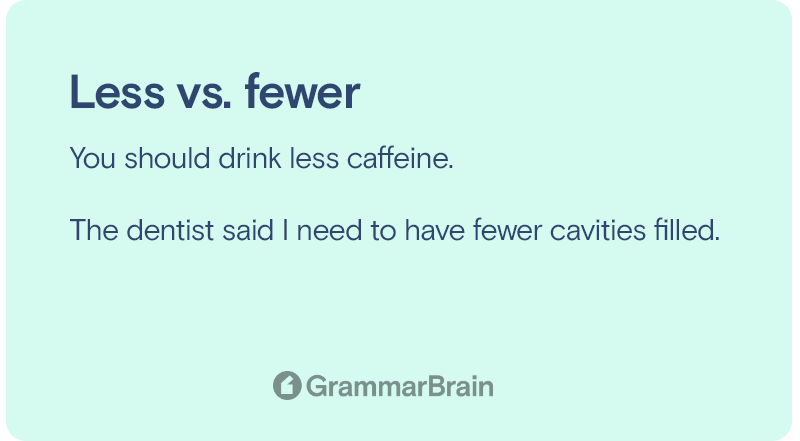
Quantity
Less:
- You should drink less caffeine.
- There are ten less jelly beans in the jar.
- I have to leave for work in less than an hour.
- There are less people here today.
- I have less than 10 apples.
- There are 10 eggs less than last week.
Fewer:
- The dentist said I need to have fewer cavities filled.
- I have fewer items in my cart than before.
- I am going to fewer parties this year.
- I need fewer eggs for this recipe.
- There are fewer people in the stands today.
- We have to finish this project in fewer days.
- I have fewer than 10 items in my cart.
- There are now fewer than 10 items remaining.
- The store offers 20% off to customers with fewer than 10 items in their cart.
- We can take care of you with fewer than 10 people.
When to use “less”
“Less” is used to describe quantity. Note that “less” can only be used with uncountable nouns, such as money, time, love, etc. You cannot say “I have less friends,” because “friends” is a countable noun.
Examples
- I have less than five dollars left in my account.
- There are fewer than ten people in the room.
- I have less sugar in my coffee now. (quantity)
- He has fewer cavities than his sister does.
When to use “fewer”
Fewer can be used with countable things, such as items in a set or people in a group.
Examples
- There are fewer than 10 items in the set.
- The group has fewer than 20 people.
When referring to time, distance, or quantity. For example: “I have fewer years left to live.” “It’s only a few miles away.” or “I ate fewer cookies today.”
FAQs
What is an example of less?
How do you remember less and fewer?
There are many synonyms for less and fewer.
For example:
- Abate means to lessen or reduce in intensity.
- The decrease means to make something lower or smaller in quantity or amount.
- Diminishing means to make something smaller or weaker in effect.
- Dwindle means to decrease slowly in size, amount, or strength.
- Reduce means to bring down the number of something.
Is it wrong to use less instead of fewer?
Someone might prefer to use “fewer” because it sounds more precise, but there is no real difference in meaning between “less” and “fewer.” In most cases, either word can be used interchangeably.
Is it less people or fewer people?
Fewer people are the correct choice. “Less” is considered to be quantity, and “fewer” is considered to be number.
Inside this article
Fact checked:
Content is rigorously reviewed by a team of qualified and experienced fact checkers. Fact checkers review articles for factual accuracy, relevance, and timeliness. Learn more.
Core lessons
Glossary
- Abstract Noun
- Accusative Case
- Anecdote
- Antonym
- Active Sentence
- Adverb
- Adjective
- Allegory
- Alliteration
- Adjective Clause
- Adjective Phrase
- Ampersand
- Anastrophe
- Adverbial Clause
- Appositive Phrase
- Clause
- Compound Adjective
- Complex Sentence
- Compound Words
- Compound Predicate
- Common Noun
- Comparative Adjective
- Comparative and Superlative
- Compound Noun
- Compound Subject
- Compound Sentence
- Copular Verb
- Collective Noun
- Colloquialism
- Conciseness
- Consonance
- Conditional
- Concrete Noun
- Conjunction
- Conjugation
- Conditional Sentence
- Comma Splice
- Correlative Conjunction
- Coordinating Conjunction
- Coordinate Adjective
- Cumulative Adjective
- Dative Case
- Determiner
- Declarative Sentence
- Declarative Statement
- Direct Object Pronoun
- Direct Object
- Diction
- Diphthong
- Dangling Modifier
- Demonstrative Pronoun
- Demonstrative Adjective
- Direct Characterization
- Definite Article
- Doublespeak
- False Dilemma Fallacy
- Future Perfect Progressive
- Future Simple
- Future Perfect Continuous
- Future Perfect
- First Conditional
- Irregular Adjective
- Irregular Verb
- Imperative Sentence
- Indefinite Article
- Intransitive Verb
- Introductory Phrase
- Indefinite Pronoun
- Indirect Characterization
- Interrogative Sentence
- Intensive Pronoun
- Inanimate Object
- Indefinite Tense
- Infinitive Phrase
- Interjection
- Intensifier
- Infinitive
- Indicative Mood
- Participle
- Parallelism
- Prepositional Phrase
- Past Simple Tense
- Past Continuous Tense
- Past Perfect Tense
- Past Progressive Tense
- Present Simple Tense
- Present Perfect Tense
- Personal Pronoun
- Personification
- Persuasive Writing
- Parallel Structure
- Phrasal Verb
- Predicate Adjective
- Predicate Nominative
- Phonetic Language
- Plural Noun
- Punctuation
- Punctuation Marks
- Preposition
- Preposition of Place
- Parts of Speech
- Possessive Adjective
- Possessive Determiner
- Possessive Case
- Possessive Noun
- Proper Adjective
- Proper Noun
- Present Participle
- Prefix
- Predicate



